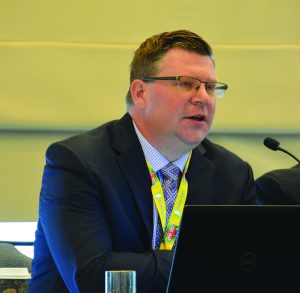(Note: This story appears in the September 2021 issue of ED Magazine)
Top industry attorneys discussed the legal parameters of rebounding from COVID and the effects of a changed and unpredictable SCOTUS.
The EXPO 2021 Legal Panel presented five top industry attorney/panelists on the state of the industry today in the wake of COVID-19, a new administration in Washington, a changed Supreme Court, and devastating image suits.
In part two of this two-part Legal Panel report, Cleveland attorney J. Michael Murray talks about adult entertainment and the new Supreme Court. Lansing, Michigan attorney Matt Hoffer details what funds were available to aid adult businesses, his lawsuits to stop the Small Business Administration (SBA) from excluding adult clubs from Paycheck Protection Program (PPP) loans, and how to maximize your chances of getting government aid.
J. Michael Murray
 Murray has had extensive experience in all phases of defending adult businesses in state and federal arenas and in criminal defense representation, including complex, high-profile jury trials. Murray talked about the Supreme Court’s different composition since it last addressed nude dancing, how that change will affect First Amendment law and how adult businesses can protect against litigating cases in front of the Court.
Murray has had extensive experience in all phases of defending adult businesses in state and federal arenas and in criminal defense representation, including complex, high-profile jury trials. Murray talked about the Supreme Court’s different composition since it last addressed nude dancing, how that change will affect First Amendment law and how adult businesses can protect against litigating cases in front of the Court.
Murray cautioned the “liberty bashers” aren’t going away. They continue to attack the adult industry and seek to impose their views of morality on society. Accordingly, alcohol bans, licensing, zoning, anti-nudity, distance requirements, and other time, place, and manner restrictions regulating constitutionally-protected erotic dancing continue to be adopted, all designed to put adult businesses out of business.
Murray explained we’ll continue to seek judicial relief from these suffocating laws when necessary. If your club’s existence is dependent on erotic dancing, noted Murray, it’s ultimately in the hands of the U.S. Supreme Court.
Murray explained how free speech protection came to adult businesses. The First Amendment prohibits Congress from making laws abridging free speech. Besides federal laws, the court ultimately held this also applies to state and municipal governments through the 14th Amendment.
The Supreme Court has said live entertainment performances, plays, rock musicals, etc., receive First Amendment protection as a form of speech communicating messages, stories, ideas. Nude dancing performances are the same, communicating erotic messages, even telling stories through performances. So the court grudgingly acknowledged, long ago, that nude dancing has some degree of First Amendment protection because it communicates that erotic message.
The Court has addressed nude dancing three times — most recently, in the 2000 Pap’s case surrounding Erie, Pennsylvania’s anti-nudity ordinance. The court upheld the city ordinance but still narrowly agreed that nude dancing deserves First Amendment protection. It’s a different Court today. Seven current justices weren’t around for Pap’s. Conservative Republican presidents appointed most. George W. Bush appointed Chief Justice John Roberts and Justice Samuel Alito. Female Justices Sonia Sotomayor and Elena Kagan were Obama nominees. And to fulfill his pledge to appoint the most conservative justices possible, particularly on cultural issues, Donald Trump appointed Justices Neil Gorsuch, Brett Kavanaugh, and Amy Coney Barrett, all ultra-conservatives.
“They haven’t yet decided any adult industry cases, but there’s no reason to believe they’ll be friendly to this industry, and we have reason to worry,” cautioned Murray.
Your industry’s always been at the forefront of the battles over freedom of expression and liberty, which have secured your right to present constitutionally protected performances. These were battles of freedom for every American.
— J. Michael Murray
The only two current justices who heard the Pap’s case were extremely conservative Justice Clarence Thomas, who voted to uphold the ordinance, and Justice Stephen Breyer, who also voted to uphold the Pap’s anti-nudity ordinance.
Murray cautioned operators must be concerned; there could be a majority willing to rollback or eliminate constitutional protections for nude dancing in adult nightclubs. It only takes five justices, and there could be six, so operators must be politically smart and good neighbors running quality clubs in their communities.
“You must provide us good sets of facts when we go to court,” explained Murray. “Your industry’s always been at the forefront of the battles over freedom of expression and liberty, which have secured your right to present constitutionally protected performances. These were battles of freedom for every American. So keep up the good work, and help us win and hold off what could be a difficult time — the next time the Supreme Court considers constitutional protection for erotic dancing.”
Matt Hoffer
 Matt Hoffer has primarily represented gentlemen’s clubs nationwide for constitutional, zoning, regulatory, and wage-and-hour issues for his entire career. Hoffer talked about the successful legal battle his firm recently spearheaded to prevent the SBA from excluding gentlemen’s clubs from receiving millions of dollars in pandemic-related aid.
Matt Hoffer has primarily represented gentlemen’s clubs nationwide for constitutional, zoning, regulatory, and wage-and-hour issues for his entire career. Hoffer talked about the successful legal battle his firm recently spearheaded to prevent the SBA from excluding gentlemen’s clubs from receiving millions of dollars in pandemic-related aid.
Hoffer talked about the major federal relief programs that had existed. Among these, the PPP supplied employee payroll during the shutdowns. The PPP assistance was provided as loans but were forgiven if used for things like rent, utilities, and payroll. Additional PPP funding was provided in the Consolidated Appropriations Act. The CARES Act’s COVID-EIDL provision provided small businesses with low-interest disaster recovery loans. Finally, the current administration’s Restaurant Revitalization Fund furnishes grants that don’t require reimbursement.
Second, Hoffer’s firm challenged the “prurience” rule as contrary to the First Amendment. A major question is, legally, whether these types of programs are benefit programs or subsidy programs, which are essentially government spending. With subsidies, Congress and the SBA can do as they like, except discriminate based on content. Thus, the burden is on the plaintiff to show that government has targeted a specific type of expression for denial, which Hoffer noted isn’t as easy as one might expect.
By contrast, the doctrine of unconstitutional conditions prohibits the government from denying a benefit based on a would-be recipient’s exercise of a constitutional rights, such as First Amendment rights.
Hoffer’s lawsuit further challenged the SBA’s use of the term “prurient.” When Congress uses a word with an established legal definition, it’s assumed it’s using it that way. Prurient is part of the Miller Test, which decides what type of speech, video, and pictures are obscene and, as such, not protected by the First Amendment. Prurient is defined as a shameful, morbid, unhealthy interest in sex, as opposed to normal healthy sexual desires. SBA loan applications ask whether you present prurient entertainment. Adult club operators who’ve applied didn’t regard their entertainment as shameful or morbid. However, the SBA disagreed, claiming prurient was whatever they say it is.
“As these programs are announced in the legislature, look at whether it’s something your business would benefit from and whether you’d be eligible. Then be prepared to apply as soon as possible. If you wait, you’ll be out of luck because it’s first come, first served. We’re all paying for it, so you better get a piece.” — Matt Hoffer
Hoffer explained this prurient restriction was shot down in three main adult nightclub/SBA COVID suits: Hoffer’s DV Diamond Club case, involving 53 clubs, the Camelot Banquet Rooms, Inc. Wisconsin case involving three clubs, and D. Houston Inc. et al., involving two Texas clubs.
Hoffer’s most recent cases involve the second round of PPP loans and the Restaurant Revitalization Fund, which gives priority to applications by women and post-war veterans. Applications by these preferred groups exceeded the entire amount allocated for the fund. Hoffer’s firm has been able to get Department of Justice attorneys to set aside Restaurant Revitalization funds these establishments would get if they won the case at the beginning, so the whole case needn’t be decided before the money runs out.
“As these programs are announced in the legislature, look at whether it’s something your business would benefit from and whether you’d be eligible,” suggested Hoffer. “Then be prepared to apply as soon as possible. If you wait, you’ll be out of luck because it’s first come, first served. We’re all paying for it, so you better get a piece.”
Hoffer noted that, a successful lawsuit may only verify eligibility and secure the applicant’s priority in line. So even if you win, if there’s no money left, you’ll get nothing.
Contact attorney J. Michael Murray at 216-781-5245 or email jmmurray@bgmdlaw.com. Contact attorney Matt Hoffer at 517-886-6560 or email matt@bradshaferlaw.com.
Larry Kaplan has for 21 years been the Legal Correspondent for ED Magazine. Mr. Kaplan is a broker in the sale and purchase of adult nightclubs and adult retail stores and the founder and Executive Director of the ACE of Michigan adult nightclub state trade association.





























